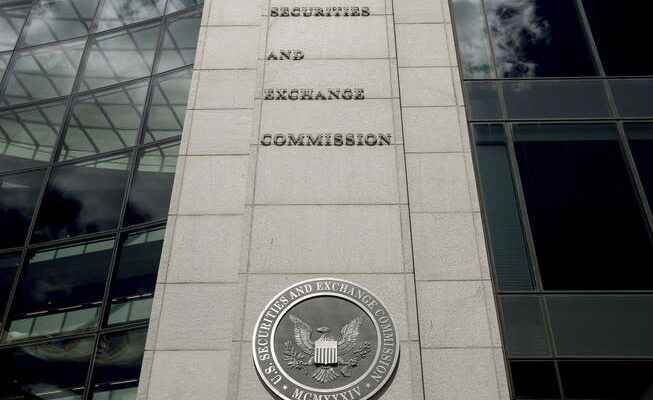The CEO of the troubled crypto exchange FTX is looking for a new “white knight” after the withdrawal from Binance. Market observers are now demanding that the authorities monitor cryptocurrency trading platforms more closely.
The American stock exchange regulator SEC is also investigating the case involving the tumbling crypto exchange FTX.
He was traded by the American financial press as the “next Warren Buffett”, now his cryptocurrency exchange FTX and its sister company Alameda Research are threatened with collapse. The companies of 30-year-old billionaire Sam Bankman-Fried got into trouble after an industry portal in early November triggered a bank run-like withdrawal of customer funds with a critical report on FTX’s business practices.
On Wednesday and Thursday, Bankman-Fried attempted to raise an alleged $7 billion injection of funds from competing platforms. If FTX does not receive the necessary funds immediately, the company will go bankrupt, he is said to have told potential investors, according to the Bloomberg news agency.
On Wednesday evening (local time), the world’s largest crypto exchange Binance backed down after an original, non-binding expression of interest regarding a takeover of FTX. After a thorough review of the company, as well as recent reports of misappropriation of customer funds and investigations by the US authorities, Binance has decided not to pursue the acquisition any further.
According to experts, a bankruptcy of FTX would set the entire crypto industry back by years. Rumors circulated on Thursday about new investors who could save FTX from going under as “white knights”. But the bad news about the ailing crypto exchange FTX does not stop. The Bahamian securities regulator announced on Thursday (local time) that it had frozen assets of FTX Digital Markets. Next, an insolvency administrator could take over the settlement. The supervisory authority has already submitted a corresponding court application.

FTX CEO Sam Bankman-Fried is scrambling to find investors who could bail out his crypto exchange.
Parallels to the great financial crisis
The possible collapse of a large crypto trading platform brings back memories of the great financial crisis of 2007 and 2008. At that time, the institutions that went under were called Bear Stearns, Lehman Brothers or Northern Rock.
In the course of the so-called crypto winter that started at the beginning of the year, the collapse of the Celsius platform, the cryptocurrency system Terra/Luna and now possibly FTX could mark the beginning of a turning point. There is already talk of a “Lehman moment” in the crypto scene. As was the case during the financial crisis, a combination of highly complex, often leveraged financial transactions and non-transparent corporate management also created a concentration of risk in the FTX case.
Stricter regulation of the crypto industry called for
Meanwhile, pressure is mounting around the world on lawmakers and financial regulators to tighten oversight over the operations of large centralized crypto exchanges and other players. Fabian Schär, a professor of blockchain technology at the University of Basel, says the extent of the disruption has surprised everyone, even if the problems with centralized exchanges are not new.
“When file-sharing platforms don’t have their risk management under control, it shows once again how necessary it is to regulate the centralized actors in the sector.” Platforms that offer banking services based on blockchain technology should be regulated more strictly. Schär says there is no way around further promoting the professionalization of the sector.
At the same time, he advocates not lumping problematic players such as FTX and the blockchain concept on which cryptocurrencies are based in the same pot in the public debate. Nothing has changed in the potential of the technology. “The FTX debacle is definitely bad for the reputation of the industry.”
The head of investment at the Raiffeisen Group, Matthias Geissbühler, who is known as a critic of cryptocurrencies, also believes it is necessary for the regulators to take a closer look at the crypto industry in the future. «After the crisis in 2008, regulation of the banks tightened significantly. The crypto market today is comparatively virtually unregulated. That doesn’t make much sense.”
Regulators may still lack the know-how to proactively address risks in this market segment. “The boom developed incredibly quickly, but the mills of the regulators grind slowly.”
Spillover to traditional financial sector unlikely
The extent to which the collapse of FTX and the associated crypto token FTT will put other industry representatives in financial difficulties is not yet foreseeable. The risk of a total loss is currently limited to those investors who have deposited cryptocurrencies with FTX.
Despite the size of the platform, it is unlikely that the FTX case will spread to traditional financial market players and banks, as the volume of the crypto market is too small for that. “Even when cryptocurrency prices were at their peak, their total market capitalization was only roughly the size of the entire silver market,” says Geissbühler. The price increases were an expression of a speculative bubble driven by cheap money.
Marc Bürki, CEO of Switzerland’s largest online broker, Swissquote, also sees the risk of the turbulence spreading to the regular capital market as small. There are still many solid providers operating in the crypto industry who are not affected by the turmoil in FTX. Swissquote itself has no connection to the platform. «We keep the cryptos ourselves. External trading places are only used as transaction centers.»
Swissquote just announced the launch of its own cryptocurrency trading platform called SQX in October. This should benefit from the problems with FTX: The debacle shows the advantages of trading platforms that are operated by regulated banks with appropriate capital cushions.
Bürki sees the current development as a sign of consolidation in the industry after years of unbridled growth. “The exaggerations from the past are now being cleaned up.” Despite price losses in the double-digit percentage range, large cryptocurrencies such as Bitcoin and Ether have “held up relatively well” in the past few days. He would have expected an even stronger price reaction, says Bürki.
